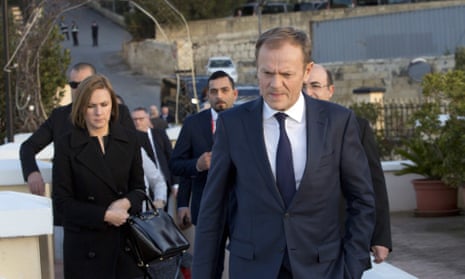President Trump’s executive order on immigration is an assault on Europe’s interests and values. It condemns entire nations and prevents refugees who have committed no crime from finding safety, making an international response to the refugee crisis all the harder. It also risks setting back co-operation on terrorism while stimulating Isis’s recruitment. We call on the European leaders in Malta to respond in three ways:
The EU should speak with one voice in defence of international agreements and basic human rights, including the right of refuge. Seeking special deals on a country-by-country basis will simply weaken everyone.
The EU should launch a rule-of-law mission to assist EU citizens in US ports and airports. The EEAS and the member states should coordinate efforts in Washington, in order to offer the best consular protection to European citizens possible. Dual citizens should not be discriminated on the basis of their second passport.
The isolationist policies of our transatlantic neighbour should drive European nations closer together in sharing intelligence within the EU in order to enhance protection against terrorist threats. It is high time to think about European security, both internally and externally, in a more consolidated and responsible fashion.
Europe’s place in the world is under threat from power politics, closed borders and closing societies. European leaders should not stand by as international agreements aimed at protecting the weak, the vulnerable, and those fleeing war and torture are invalidated by late night executive orders.
Mark Leonard Director, European Council on Foreign Relations
Carl Bildt Former prime minister of Sweden
Alexander Stubb Former prime minister of Finland
John Bruton Former taoiseach of Ireland
Pascal Lamy Former director-general of the WTO; former EU commissioner
Javier Solana Former secretary general of Nato
Wolfgang Schüssel Former chancellor of Austria
George Papandreou Former prime minister of Greece
Gordon Bajnai Former prime minister of Hungary
Hans Eichel Former finance minister of Germany
Lykke Friis Former minister for climate, energy and gender equality, Denmark
Andrzej Olechowski Former foreign minister of Poland
Connie Hedegaard Former European commissioner for climate action
Martin Lidegaard Former foreign minister of Denmark
Baroness Janet Royall Former leader of the opposition in the UK House of Lords
Adam D Rotfeld Former foreign minister of Poland; Co-chairman of Polish-Russian Group on Difficult Matters; Commissioner of Euro-Atlantic Security Initiative
Gunilla Carlsson Former international development cooperation minister of Sweden
Joaquín Almunia Former vice-president of the European commission
Tibor Dessewffy President, Demos Hungary
Karin Forseke Chairman, Alliance Trust Plc
Carlos Gaspar Member of the board of directors, Portuguese Institute of International Relations (IPRI)
Sylvie Goulard Member of the European parliament
Marietje Schaake Member of the European parliament
Teresa Gouveia Trustee to the board of the Calouste Gulbenkian Foundation; former foreign minister of Portugal
Sandra Kalniete Former foreign minister of Latvia; Member of the European parliament
Roderich Kiesewetter CDU special representative for foreign affairs
Heather Grabbe Executive director, Open Society Policy Institute
Ulrike Guérot Senior associate for Germany, Open Society Initiative for Europe
Bassma Kodmani Executive director, Arab Reform Initiative
David Koranyi Director, Energy Diplomacy Initiative, Global Energy Center, The Atlantic Council
Brigid Laffan Director of the Robert Schuman Centre for Advanced Studies and Global Governance Programme, European University Institute
Sonja Licht President, Belgrade Fund for Political Excellence
Irene Lozano Writer; former member of the Congress of Deputies
Miguel Maduro Professor and director, Global Governance Programme at the European University Institute; former minister
Kalypso Nicolaïdis Professor of international relations, University of Oxford
Christine Ockrent Commentator and writer; Presenter of Affaires Internationales, France Culture Radio
Dick Oosting Former CEO, European Council on Foreign Relations
Behlul Ozkan Assistant professor, Marmara University
Žaneta Ozoliņa Professor, University of Latvia; former director, Latvian Centre for Human Rights
Lapo Pistelli Senior vice-president, stakeholder relations for business development support, ENI; former deputy foreign minister of Italy
Albert Rohan Austrian ambassador (retired)
Daniel Sachs CEO, Proventus
Aleksander Smolar Chairman of the board, Stefan Batory Foundation
Ion Sturza Founder and chairman, Fribourg Capital; former prime minister of Moldova
Hannes Swoboda Former president, Progressive Alliance of Socialists and Democrats, European parliament
Anna Terrón Special adviser to the European commissioner for trade; President, InStrategies
Nathalie Tocci Deputy director, Istituto Affari Internazionali
Jose Ignacio Torreblanca Editorial director, El País
Erkki Tuomioja Former foreign minister of Finland
Ivan Vejvoda Director, Europe Project, Institute for Human Sciences
Antonio Vitorino Lawyer; former EU commissioner
André Wilkens Publisher and author
Join the debate – email guardian.letters@theguardian.com
